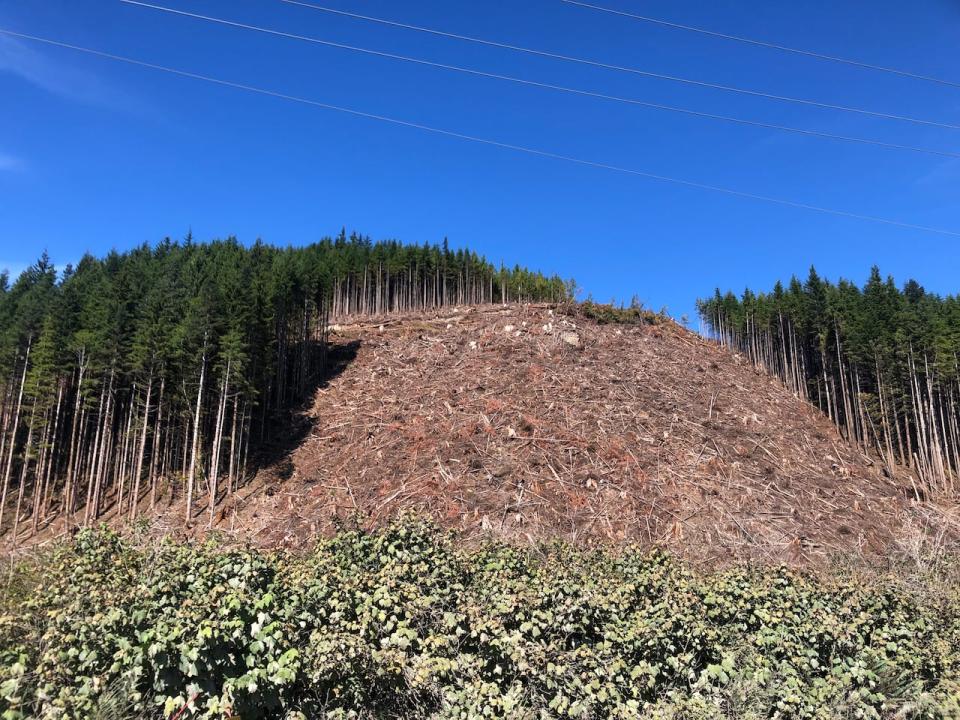B.C. government hasn't fulfilled promise to revise forestry practices, conservationists say

In September 2020, the B.C. NDP released a report that made 14 recommendations to overhaul forestry management in the province and promised to implement those changes within a three-year timeline.
This week marks the third anniversary of that announcement, and while the government says it is making good on its promise, critics say the deadline has passed and not enough has been done.
The 2020 report A New Future for Old Forests was prepared by Garry Merkel, a natural resource expert and member of the Tahltan Nation, along with Al Gorley, a former chair of the Forest Practices Board.
Its recommendations include engaging Indigenous leaders on forestry policies, increased transparency about forest conditions, and deferring development in old-growth forests until a new management strategy can be implemented.
Torrance Coste, national campaign director for the Wilderness Committee, was hopeful when the report first came out, but he says its recommendations have yet to become reality and his optimism is waning.
"Unfortunately, zero of the 14 are in effect and it's profoundly disappointing," Coste told CBC's On The Island on Monday.
The Wilderness Committee has issued a joint news release with the Union of B.C. Indian Chiefs, Sierra Club B.C.,and Stand.earth that says the province has not yet shared how much old growth was logged in 2022 or how much old growth logging has been stopped through the deferrals process over the last three years.
"We don't know how many of those deferrals overlapped with actual plans and approved logging. We do know that there is a significant amount, tens of thousands of hectares, of logging in that most at-risk priority for deferral area that has gone ahead," said Coste.

Logging activity near Holberg in northern Vancouver Island pictured in August. (Bridgette Watson/CBC News)
Forests Minister Bruce Ralston, also speaking to On The Island, said his ministry remains "fully committed" to acting on the report's recommendations and has already deferred logging on 2.25 million hectares (22,500 square kilometres) of old growth and is currently engaging with over 200 First Nations.
"That is a profound and deep process that is already underway in a very intense way," said Ralston.
Ralston said the province has also acted on a recommendation to create a silviculture innovation program, with the goal of developing harvesting alternatives to clear-cutting, by investing $10 million to get that program operating.
"We need a new approach to forest management that respects climate, ecological values, Indigenous values and communities and that's the profound transformation that we're engaged in," said the minister.
The B.C. Green Party is among those not convinced action is being taken fast enough.
In a statement it said that despite promises and rhetoric, ancient trees continued to fall while the B.C. NDP deliberated the definition of old-growth and prioritized profits above the profound paradigm shift they promised in 2020.
"That is not the pace or scale of action we need from this government. The B.C. NDP continues to leave opportunities untapped — and landscapes and biodiversity at risk," said Adam Olsen, Green MLA for Saanich North and the Islands and a member of the Tsartlip First Nation.
"It's time to see the writing on the wall — forestry management in the province isn't serving anyone, other than industry," added Olsen.

The remains of a cut block is seen in the Fairy Creek logging area near Port Renfrew, B.C., in October 2021. (Jonathan Hayward/The Canadian Press)
While Sept. 11 marks the three-year anniversary of the report's release, one of its co-authors is confident any perceived lack of action is not from a lack of intent.
Merkel — who along with Gorley met with conservationists, unions, First Nations and the public to ask about the ecological, economic and cultural importance of old growth trees and forests to inform their report — told CBC's The Early Edition he estimates the province is about 18 months behind schedule when it comes to implementing his recommendations.
Merkel says the COVID-19 pandemic, integrating the principles of the Declaration on the Rights of Indigenous Peoples Act and United Nations Declaration on the Rights of Indigenous People, and ensuring that Indigenous governments are part of the decision-making process has proven "much more complex than anybody ever thought."
"This is a major systemic change ... I think all of us just didn't appreciate how big this actually is," said Merkel.


